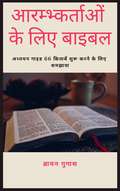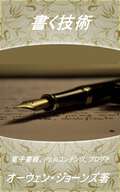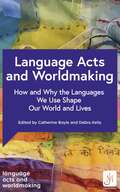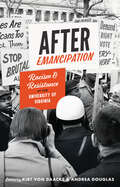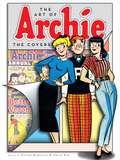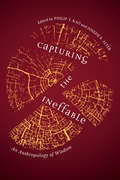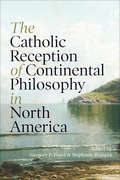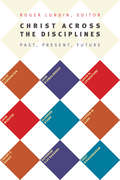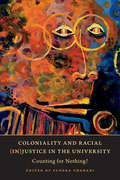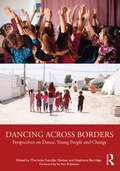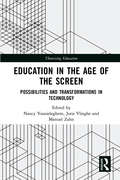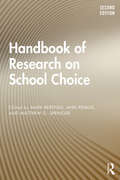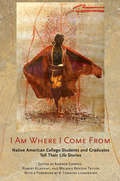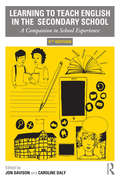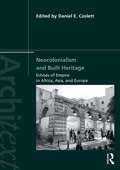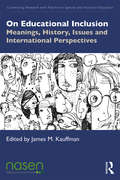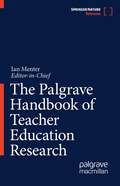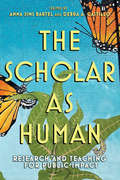- Table View
- List View
आरम्भ्कर्ताओं के लिए बाइबल: अध्ययन गाइड 66 किताबें शुरू करने के लिए समझाया (Action Packs Ser. #115)
by ब्रायन गुगासयुगों से लोग मार्गदर्शन और आशा के लिए बाइबिल की तरफ मुड़े हैं| यह बाइबिल अध्ययन की पुस्तक शुरुआती लोगों के लिए बाइबिल की प्रशंसा विकसित करने और इसे दैनिक जीवन का हिस्सा बनाने के लिए एक नक़्शे के रूप में कार्य करती है| बाइबिल की सभी 66 पुस्तकें विस्तार से शामिल हैं: •प्रत्येक पुस्तक के लेखक और उस समय की रूपरेखा जिसमें वह लिखी गई थी •प्रत्येक पुस्तक का मुख्य विषय •प्रत्येक पुस्तक के सन्देश का सारांश •चिंतन और आगे की खोज के लिए एक भक्ति बाइबिल की कहानियों, भविष्यवाणियों और संदेशों में खुद को विसर्जित कर दें और ईश्वर और ईसा मसीह की विस्मयकारी शक्ति, दया और उपचार शक्ति की खोज करें| अनुग्रहकारी और प्रेरणादायक, शुरुआती लोगों के लिए बाइबिल अध्ययन पाठक को मूल बातों में वापस लाता है और इश्वर के जीवित शब्द के साथ एक सीधे सम्बन्ध का रास्ता खोलता है|
Agnikundma ugelu gulab Biography of late shri Mahadev Haribhai Desai: અગ્નિકુંડમાં ઊગેલું ગુલાબ
by નારાયણ દેસાઈ1500 પાનામાં વિસ્તરેલું આ ચરિત્ર જેટલું પ્રાસાદિકક છે તેટલું જ તટસ્થ રીતે લખાયેલું છે . પિતાના ચરિત્ર લેખે એ જવું અધિકૃત(ઑ્થન્ટક) છે એવું જ મહાદેવ - ચરિત્ર લખે એ સર્વગ્રાહી છે. મહાદેવભાઈના સાક્ષાત્ પરિચય ઉપરાત બીજા ઘણા ચરિત્ર-સંદર્ભગ્રાંથોમાથી નારાયણભાઈ પસાર થયા છે. (એમણે લખ્યું છે : `મહાદેવભાઈની ડાયરી કહેવાય મહાદેવભાઈની, પણ એમાં રજમાત્ર જીવનવિગત મહાદેવભાઈની ન જડે ! એટલે મારે મહાદેવભાઈ બીજે જ ખોળવા પિયા!') લાંબા પટમાં લખાયેલું હોવા છતાં ન થકવનારું આ પુસ્તક હાથમાથી મૂકવાનું મન નહીં થાય... \
Divaswapn: દિવાસ્વપ્ન
by ગીજુભાઈ બધેકાદિવાસ્વપ્ન પુસ્તક ૩ ખંડ માં લખાયેલ છે પ્રથમ ખંડ માં ૧૦ પ્રકરણ છે.દ્વિતીય ખંડ માં ૭ પ્રકરણ છે . તૃતીય ખંડ માં ૯ પ્રકરણ આપેલ છે અને અંત માં સન્માનથેલી અર્પણ સમારંભ પ્રસંગે આપેલા ભાષણમાંથી લીધેલ પ્રશંગ રજુ કરવા માં આવેલ છે .
Pratinidhi Kahaniyan-Geetanjali Shree
by गीतांजलि श्रीयह गीतांजलि श्री की कहानियों का प्रतिनिधि संचयन है। गीतांजलि की लगभग हर कहानी अपनी टोन की कहानी है और विचलन उनके यहाँ गभग नहीं के बराबर है और यह बात अपने आपमें आश्चर्यजनक है क्योंकि बड़े-से-बड़े लेखक कई बार बाहरी दबावों और वक़्ती ज़रूरतों के चलते अपनी मूल टोन से विचिलत हुए हैं। यह अच्छी बात है कि गीतांजलि श्री ने अपनी लगभग हर कहानी में अपनी सिग्नेचर ट्यून को बरकरार रखा है। लेकिन सवाल यह है कि गीतांजलि कीकहानियों की यह मूल टोन आखिर है क्या? एक अजीब तरह का फक्कड़पन, एक अजीब तरह की दार्शनिकता, एक अजीब तरह की भाषा और एक अजीब तरह की रवानी। लेकिन ये सारी अजीबियतें ही उनके कथाकार को एक व्यक्तित्व प्रदान करती हैं। यहाँ यह कहना ज़रूरी है कि यह सब परम्परा से हटकर है और परम्परा में समाहित भी।
書く技術: 電子書籍、PLRコンテンツ、ブログを (方法...シリーズ #123)
by オーウェン・ジョーンズ本書『電子書籍、PLRコンテンツ、ブログを書く方法』をご購入いただきありがとうございます。 この本の内容があなたにとって有益なものであることを願っています。 さまざまな形態のコンテンツ執筆に関する本書の情報は、それぞれ千字ほどからなる十八の章にまとめてあります。 執筆能力を高めたい方々にとって、興味深い内容となっているはずです。 本書を購入して頂いたボーナスプレゼントとして、ご購入者様が本書の内容をご自身のウェブサイトやブログ、メールマガジンで自由に使用できる許諾を付与させて頂きます。もちろん、本書の内容をまずご自身の言葉で書き直すことができるのであれば、その方が良いでしょう。 本書の内容を分割して、記事を再販して頂いても構いません。実際のところ、ご購入者様に付与されていない唯一の権利は、本書を購入した内容のまま、再販したり誰かに譲渡したりすることだけです。 ご意見・ご感想がありましたら、本書の購入元へお伝えください。 最後にもう一度、本書をご購入いただいたことに感謝申し上げます。
Language Acts and Worldmaking: How and Why the Languages We Use Shape Our World and Our Lives
byCollectively authored by the Language Acts and Worldmaking team, this defining volume offers reflective narratives on research, theory and practice over the course of the flagship project of the same name, funded by the Arts and Humanities Research Council's Open World Research Initiative. It returns to the project's key principles - that our words make worlds and we are agents in worldmaking - analyses the practices and outcomes of collaborative working, and looks to the future by offering concrete ideas for how the work they have done can now continue to do its work in the world.Focusing on the key research strands, this volume looks at the role of the language teacher as a mediator between languages and cultures, worldmaking in modern languages, translation and the imagination, languages and hospitality, digital mediations, and how words change and make worlds. Critically, it analyses the impact on communities of living in multilingual cities, and the ways in which learning a first language, and then a second, and so on, plays a crucial role in our ability to understand our culture in relation to others and to appreciate the ways in which they are intertwined.Specific aims are to: · propose new ways of bridging the gaps between those who teach and research languages and those who learn and use them in everyday contexts from the professional to the personal · put research into the hands of wider audiences · share a philosophy, policy and practice of language teaching and learning which turns research into action · provide the research, experience and data to enable informed debates on current issues and attitudes in language learning, teaching and research · share knowledge across and within all levels and experiences of language learning and teaching · showcase exciting new work that derives from different types of community activity and is of practical relevance to its audiences · disseminate new research in languages that engages with diverse communities of language practitioners.
Language Acts and Worldmaking: How and Why the Languages We Use Shape Our World and Our Lives
byCollectively authored by the Language Acts and Worldmaking team, this defining volume offers reflective narratives on research, theory and practice over the course of the flagship project of the same name, funded by the Arts and Humanities Research Council's Open World Research Initiative. It returns to the project's key principles - that our words make worlds and we are agents in worldmaking - analyses the practices and outcomes of collaborative working, and looks to the future by offering concrete ideas for how the work they have done can now continue to do its work in the world.Focusing on the key research strands, this volume looks at the role of the language teacher as a mediator between languages and cultures, worldmaking in modern languages, translation and the imagination, languages and hospitality, digital mediations, and how words change and make worlds. Critically, it analyses the impact on communities of living in multilingual cities, and the ways in which learning a first language, and then a second, and so on, plays a crucial role in our ability to understand our culture in relation to others and to appreciate the ways in which they are intertwined.Specific aims are to: · propose new ways of bridging the gaps between those who teach and research languages and those who learn and use them in everyday contexts from the professional to the personal · put research into the hands of wider audiences · share a philosophy, policy and practice of language teaching and learning which turns research into action · provide the research, experience and data to enable informed debates on current issues and attitudes in language learning, teaching and research · share knowledge across and within all levels and experiences of language learning and teaching · showcase exciting new work that derives from different types of community activity and is of practical relevance to its audiences · disseminate new research in languages that engages with diverse communities of language practitioners.
After Emancipation: Racism and Resistance at the University of Virginia (The American South Series)
Assessing a university&’s legacy in the age of segregation This anthology reckons with the University of Virginia&’s post-emancipation history of racial exploitation. Its fifteen essays highlight the many forms of marginalization and domination at Virginia&’s once all-white flagship university to uncover the patriarchal, nativist, and elitist assumptions that shaped university culture through the late nineteenth century and well into the twentieth. Including community responses ranging from personal reflections to interviews with local leaders to poems, this accessible volume will be essential reading for anyone with ties to UVA or to Charlottesville, as well as for anyone concerned with the legacy of slavery and segregation in America&’s universities.
The Art of Archie: The Covers (The Art of Archie)
Archie's new hardcover art book is a beautifully-designed celebration of over 70 years of comic book covers featuring America's reigning cartoon high school icons: Archie, Betty, Veronica and friends. Featuring beautiful full-color artwork by fan favorite artists Dan DeCarlo, Harry Lucey, Bob Montana, Dan Parent and many more in a deluxe, oversize hardcover edition, The Art of Archie: The Covers goes behind the scenes on the all-time best comic book covers in Archie's history with a look at their inspiration, creation and ongoing cultural legacy. The Art of Archie: The Covers is the perfect purchase for comic book fans, Americana buffs and pop culture aficionados of all sorts, brought to you by Victor Gorelick and Craig Yoe, the team behind the critically-acclaimed The Art of Betty and Veronica.
Capturing the Ineffable: An Anthropology of Wisdom
Grounded in ethnographic case studies that examine experiences from which wisdom emerges, Capturing the Ineffable provides a rigorous analysis of the sociocultural context of wisdom in the contemporary world. Each chapter in the volume deals with different aspects and showcases how communities in different contexts — nursing homes, religious organizations, corporations, and monastic institutions, for example — engage with the ineffability of wisdom. Contributors draw from a range of disciplines and cross-cultural and historical data in order to interpret the meaning and value of wisdom as a human endeavour. This book also represents an anthropological method for evaluating various philosophical and scientific approaches to understanding wisdom, including how wisdom is learned and taught. Readers will be able to appreciate how action, emotion, uncertainty, and cultural systems come to bear on wisdom as a value in human life and expression. In the end, Capturing the Ineffable reveals how the conception and paradoxical nature of wisdom dispels the dichotomies of self/other, structure/agency, known/unknown, nature/culture, and the like. What is at stake is a recasting of wisdom as a particular kind of anthropological endeavour and, thus, a return to and modification of philosophical anthropology.
The Catholic Reception of Continental Philosophy in North America
This volume by leading philosophers and theologians explores the reception of continental philosophy in North America and its ongoing relation to Catholic institutions. What has prompted so many North American Catholics to support this particular school of thought? Why do so many Catholics continue to find continental philosophy attractive, and why do so many continental philosophers work in Catholic departments? The establishment of the relationship between continental philosophy and Catholicism was not obvious, nor was it easy. Many of the contributors to this volume have played important roles in its development, and in these pages they take a stance on this evolving relationship and demonstrate that the engagement is far from over. Exploring the mutual interests that made this alliance possible as well as the underlying tensions, the volume provides, for the first time, an extended reflection on the historical, institutional, and intellectual relationship between Catholicism and continental philosophy on North American soil up to the present day.
Christ Across the Disciplines: Past, Present, Future
In Christ across the Disciplines a group of distinguished scholars from across the theological spectrum explores the dynamic relationship between the Christian faith and the life of the mind. Although the essays in this volume are rooted in a rich understanding of the past, they focus primarily on how Christian students, teachers, and scholars might best meet the challenges of intellectual and cultural life in a global world.This book ranges widely over the broad terrain of contemporary academic and cultural life, covering such topics as the enormous growth of political activism in late twentieth-century evangelicalism, the dynamics of literature and faith in the African-American experience, the dramatic implications of globalization for those who profess Christ and practice the life of the mind, and more!
Coloniality and Racial (In)Justice in the University: Counting for Nothing?
Coloniality and Racial (In)Justice in the University examines the disruption and remaking of the university at a moment in history when white supremacist politics have erupted across North America, as have anti-racist and anti-colonial movements. Situating the university at the heart of these momentous developments, this collection debunks the popular claim that the university is well on its way to overcoming its histories of racial exclusion Written by faculty and students located at various levels within the institutional hierarchy, this book demonstrates how the shadows of settler colonialism and racial division are reiterated in "newer" neoliberal practices. Drawing on critical race and Indigenous theory, the chapters challenge Eurocentric knowledge, institutional whiteness, and structural discrimination that are the bedrock of the institution. The authors also analyse their own experiences to show how Indigenous dispossession, racial violence, administrative prejudice, and imperialist militarization shape classroom interactions within the university.
Dancing Across Borders: Perspectives on Dance, Young People and Change
Dancing Across Borders presents formal and non-formal settings of dance education where initiatives in different countries transcend borders: cultural and national borders, subject borders, professional borders and socio-economic borders. It includes chapters featuring different theoretical perspectives on dance and cultural diversity, alongside case narratives that show these perspectives in a specific cultural setting. In this way, each section charts the processes, change and transformation in the lives of young people through dance. Key themes include how student learning is enhanced by cultural diversity, experiential teaching and learning involving social, cross-cultural and personal dimensions. This conceptually aligns with the current UNESCO protocols that accent empathy, creativity, cooperation, collaboration alongside skills- and knowledge-based learning in an endeavour to create civic mindedness and a more harmonious world. This volume is an invaluable resource for teachers, policy makers, artists and scholars interested in pedagogy, choreography, community dance practice, social and cultural studies, aesthetics and interdisciplinary arts. By understanding the impact of these cross-border collaborative initiatives, readers can better understand, promote and create new ways of thinking and working in the field of dance education for the benefit of new generations.
Discovering Algebra: An Investigative Approach, Lecciones condensadas en español Condensed Lessons in Spanish
NIMAC-sourced textbook
Education in the Age of the Screen: Possibilities and Transformations in Technology (Theorizing Education)
This edited volume brings together experts from across the field of education to explore how traditional pedagogic and didactic forms and processes are changing, or even disappearing, as a result of new technologies being used for education and learning. Considering the use, opportunites and limitations of technologies including interactive whiteboards, tablets, smart phones, search engines and social media platforms, chapters draw on primary and secondary research to illustrate the wide-reaching and often salient changes which new digital technologies are introducing into educational environments and learning practices around the world. Neither claiming that traditional forms of learning must be replaced, nor calling for a restoration of the school, Education in the Age of the Screen offers a nuanced exploration of the implications of digitization for education. Taking a broad view on education as a social and cultural phenomenon, the volume focuses on three major dimensions: the wider conditions against the background of which we educate and are educated today, detailed examples of aesthetic practices and educational initiatives in the current media culture, and concrete answers to the challenges that come our way. A comprehensive and timely consideration of the state of education in the digital age, this will be of interest to researchers, academics and post-graduate students in the fields of education and pedagogy, media and cultural studies, as well as teacher educators and trainee teachers.
Handbook of Research on School Choice
Updated to reflect the latest developments and increasing scope of school-based options, the second edition of the Handbook of Research on School Choice makes readily available the most rigorous and policy-relevant research on K–12 school choice. This comprehensive research handbook begins with scholarly overviews that explore historical, political, economic, legal, methodological, and international perspectives on school choice. In the following sections, experts examine the research and current state of common forms of school choice: charter schools, school vouchers, and magnet schools. The concluding section brings together perspectives on other key topics such as accountability, tax credit scholarships, parent decision-making, and marginalized students. With empirical perspectives on all aspects of this evolving sphere of education, this is a critical resource for researchers, faculty, and students interested in education policy, the politics of education, and educational leadership.
A History of the University in Europe
This is the final volume in a four-part series covering the development of the university in Europe (east and west) from its origins to the present day, focusing on a number of major themes viewed from a European perspective. The originality of the series lies in its comparative, interdisciplinary, collaborative and transnational nature. It deals also with the content of what was taught at the universities, but its main purpose is an appreciation of the role and structures of the universities as seen against a backdrop of changing conditions, ideas and values. This volume deals with the reconstruction and epoch-making expansion of higher education after 1945, which led to the triumph of modern science. It traces the development of the relationship between universities and national states, teachers and students, their ambitions and political activities. Special attention is paid to fundamental changes in the content of teaching at the universities.
I Am Where I Come From: Native American College Students and Graduates Tell Their Life Stories
"The organizing principle for this anthology is the common Native American heritage of its authors; and yet that thread proves to be the most tenuous of all, as the experience of indigeneity differs radically for each of them. While many experience a centripetal pull toward a cohesive Indian experience, the indications throughout these essays lean toward a richer, more illustrative panorama of difference. What tends to bind them together are not cultural practices or spiritual attitudes per se, but rather circumstances that have no exclusive province in Indian country: that is, first and foremost, poverty, and its attendant symptoms of violence, substance abuse, and both physical and mental illness.... Education plays a critical role in such lives: many of the authors recall adoring school as young people, as it constituted a place of escape and a rare opportunity to thrive.... While many of the writers do return to their tribal communities after graduation, ideas about 'home' become more malleable and complicated."—from the IntroductionI Am Where I Come From presents the autobiographies of thirteen Native American undergraduates and graduates of Dartmouth College, ten of them current and recent students. Twenty years ago, Cornell University Press published First Person, First Peoples: Native American College Graduates Tell Their Life Stories, also about the experiences of Native American students at Dartmouth College. I Am Where I Come From addresses similar themes and experiences, but it is very much a new book for a new generation of college students.Three of the essays from the earlier book are gathered into a section titled "Continuing Education," each followed by a shorter reflection from the author on his or her experience since writing the original essay. All three have changed jobs multiple times, returned to school for advanced degrees, started and increased their families, and, along the way, continuously revised and refined what it means to be Indian.The autobiographies contained in I Am Where I Come From explore issues of native identity, adjustment to the college environment, cultural and familial influences, and academic and career aspirations. The memoirs are notable for their eloquence and bravery.
Learning to Teach English in the Secondary School: A Companion to School Experience (Learning to Teach Subjects in the Secondary School Series)
Fully updated to reflect changes in teacher education and the curriculum, the Fifth Edition of Learning to Teach English in the Secondary School explores the background to debates about teaching the subject, alongside tasks, teaching ideas and further reading to expand upon issues and ideas raised in the book. Including chapters on planning, changes to the assessment system, language teaching, and cross-curricular aspects of secondary teaching, this new edition features: changes in policy and practice, including the most recent GCSE reforms; a new chapter on 'Media literacy in English'; a consideration of modern digital technology and how it underpins good practice in all areas of English teaching and learning; and cross-referencing to guidance on assessment and well-being and resilience in the core text Learning to Teach in the Secondary School. A key text for all student teachers, Learning to Teach English in the Secondary School combines theory and practice to present a comprehensive introduction to the opportunities and challenges of teaching English in the secondary school.
Neocolonialism and Built Heritage: Echoes of Empire in Africa, Asia, and Europe (Architext)
Architectural relics of nineteenth and twentieth-century colonialism dot cityscapes throughout our globalizing world, just as built traces of colonialism remain embedded within the urban fabric of many European capitals. Neocolonialism and Built Heritage addresses the sustained presence and influence of historic built environments and processes inherited from colonialism within the contemporary lives of cities in Africa, Asia, and Europe. Novel in their focused consideration of ways in which these built environments reinforce neocolonialist connections among former colonies and colonizers, states and international organizations, the volume’s case studies engage highly relevant issues such as historic preservation, heritage management, tourism, toponymy, and cultural imperialism. Interrogating the life of the past in the present, authors thus challenge readers to consider the roles played by a diversity of historic built environments in the ongoing asymmetrical balance of power and unequal distribution capital around the globe. They present buildings’ maintenance, management, reuse, and (re)interpretation, and in so doing they raise important questions, the ramifications of which transcend the specifics of the individual sites and architectural histories they present.
On Educational Inclusion: Meanings, History, Issues and International Perspectives (Connecting Research with Practice in Special and Inclusive Education)
Combining examination of policy with primary research and analysis of up-to-date literature, On Inclusive Education explores the various interpretations of inclusion, its history in education, and a range of its applications internationally. With an international complement of authors, this book features detailed yet accessible chapters on a range of topics, including inclusion in law; academically gifted students; students with severe, sensory, and multiple impairments; and case studies from Germany, Portugal, the Netherlands, and the Russian Federation. The book also examines the impact of the Convention on the Rights of Persons with Disabilities—and Article 24 in particular—and the likely legacies and future implications of recent inclusion movements. For postgraduate students and academics researching in the field of inclusive education, and also for school administrators and policy makers, On Inclusive Education is an essential resource.
The Palgrave Handbook of Teacher Education Research
This handbook presents a timeless, comprehensive, and up-to-date resource covering major issues in the field of teacher education research. In a global landscape where migration, inequality, climate change, political upheavals and strife continue to be broadly manifest, governments and scholars alike are increasingly considering what role education systems can play in achieving stability and managed, sustainable economic development. With growing awareness that the quality of education is very closely related to the quality of teachers and teaching, teacher education has moved into a key position in international debate and discussion. This volume brings together transnational perspectives to provide insight and evidence of current policy and practice in the field, covering issues such as teacher supply, preservice education, continuing professional learning, leadership development, professionalism and identity, comparative and policy studies, as well as gender, equity, and social justice.
The Scholar as Human: Research and Teaching for Public Impact
The Scholar as Human brings together faculty from a wide range of disciplines—history; art; Africana, American, and Latinx studies; literature, law, performance and media arts, development sociology, anthropology, and Science and Technology Studies—to focus on how scholarship is informed, enlivened, deepened, and made more meaningful by each scholar's sense of identity, purpose, and place in the world. Designed to help model new paths for publicly-engaged humanities, the contributions to this groundbreaking volume are guided by one overarching question: How can scholars practice a more human scholarship?Recognizing that colleges and universities must be more responsive to the needs of both their students and surrounding communities, the essays in The Scholar as Human carve out new space for public scholars and practitioners whose rigor and passion are equally important forces in their work. Challenging the approach to research and teaching of earlier generations that valorized disinterestedness, each contributor here demonstrates how they have energized their own scholarship and its reception among their students and in the wider world through a deeper engagement with their own life stories and humanity.Contributors: Anna Sims Bartel, Debra A. Castillo, Ella Diaz, Carolina Osorio Gil, Christine Henseler, Caitlin Kane, Shawn McDaniel, A. T. Miller, Scott J. Peters, Bobby J. Smith II, José Ragas, Riché Richardson, Gerald Torres, Matthew Velasco, Sara WarnerThanks to generous funding from Cornell University, the ebook editions of this book are available as Open Access volumes from Cornell Open (cornellopen.org) and other repositories.
